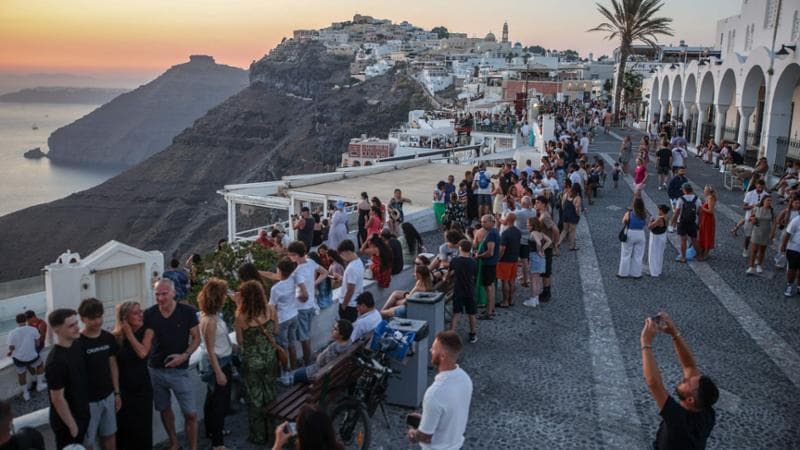Greece's Cruise Tax Initiative to Combat Over-Tourism
Discover how Greece's new cruise passenger tax aims to combat over-tourism in Santorini and Mykonos while supporting local communities and preserving beauty.

Key Points
- Greece has introduced a 20-euro tax on cruise passengers to combat over-tourism on islands like Santorini
and
Mykonos.
- Revenue from the tax will be reinvested into local infrastructure and services, addressing issues like water shortages.
- The government also plans to regulate the number of cruise ships docking to ensure a sustainable flow of visitors.
As the world slowly emerges from the long shadows cast by the pandemic, the tourism industry is witnessing a resurgence. Countries reliant on tourism are now grappling with the delicate balance between welcoming visitors and maintaining the integrity of their cherished landscapes. Greece, an emblem of tourism, has found itself at this crossroads, particularly on its famed islands of Santorini and Mykonos, where the allure of picturesque villages and stunning sunsets meet the harsh realities of over-tourism. In response to these challenges, the Greek government, under Prime Minister
, has announced a groundbreaking initiative: a 20-euro tax on cruise passengers visiting these islands during the peak summer season.

The Necessity Behind the Tax
While Greece boasts around 31 million tourist arrivals in 2023 alone, generating approximately 20 billion euros in tourism revenue, certain hotspots have been pushed to their limits. The picturesque island of Santorini, which is home to only 20,000 residents, has seen an influx of over 1.3 million cruise passengers in just a single year. The sheer volume of visitors during peak times can overwhelm local resources and infrastructure, leading to adverse effects on the environment and quality of life for residents.
During a recent press conference, Prime Minister Mitsotakis acknowledged that while Greece does not have a widespread problem of over-tourism, specific destinations experience significant pressure during certain weeks or months. The tax is part of a broader strategy to manage these pressures and ensure sustainable tourism practices that can benefit both visitors and locals alike.
Utilization of the Tax Revenue
A salient feature of this initiative is that part of the revenues generated from the cruise passenger tax will be reinvested into local communities. These funds will be utilized for critical infrastructure improvements and to tackle pressing issues such as water shortages, which have plagued these beloved islands. This dual purpose of generating revenue while facilitating community enhancements signals a move towards a more responsible tourism model.
Furthermore, the Greek government plans to regulate the number of cruise ships permitted to dock simultaneously at these islands. This measure aims to avoid the chaotic scenes witnessed this past summer when multiple vessels arrived at once, flooding Santorini with thousands of tourists in mere hours. For instance, on certain days, two cruise ships brought in nearly 16,000 tourists, leaving the small island struggling to cope. Such regulatory interventions present a proactive approach to mitigating the negative impacts of mass tourism.
Broader Measures Against Over-Tourism
In addition to the cruise passenger tax, the Greek government is considering other measures to combat the consequences of over-tourism. These include increased taxes on short-term rentals and a ban on new licenses for such rentals in central Athens, aimed at safeguarding housing options for local residents. By prioritizing the needs of inhabitants over transient visitors, Greece is setting a precedent for how tourism-heavy nations can approach similar challenges.
A Shared Responsibility
As destinations worldwide reevaluate the sustainability of their tourism practices, Greece's steps may serve as a model for balancing economic interests with environmental and community needs. Travelers can also play a role by making conscious choices—such as visiting less crowded times, choosing sustainable services, and respecting local cultures and environments. The path towards sustaining Greece's iconic beauty requires collaboration between tourists, governmental policies, and local communities alike.
In summary, Greece's introduction of a cruise passenger tax serves as a thoughtful response to the mounting challenges of over-tourism, particularly in its most visited locales. By managing the inflow of visitors and reinvesting in local communities, Greece is taking significant strides to preserve its environmental and cultural heritage. This initiative could herald a new chapter in tourism management, where the health of local ecosystems and communities is prioritized alongside economic growth. The journey towards sustainable tourism is not merely a choice for Greece—it's a necessity for preserving the beauty and integrity of its wonderful islands for generations to come.


